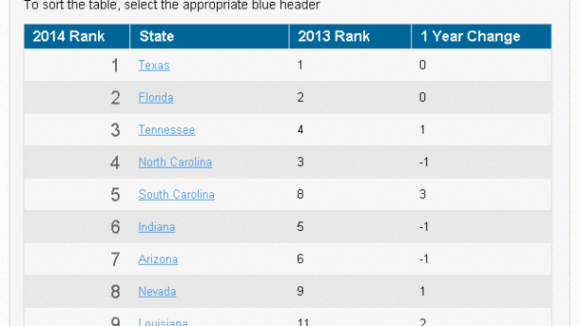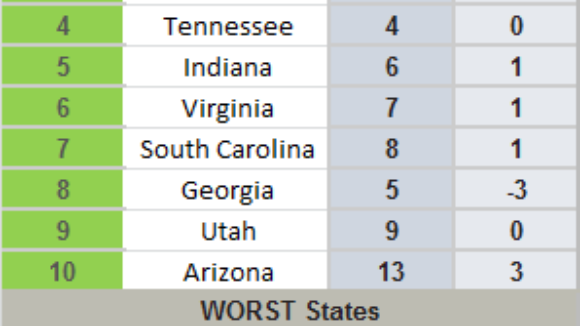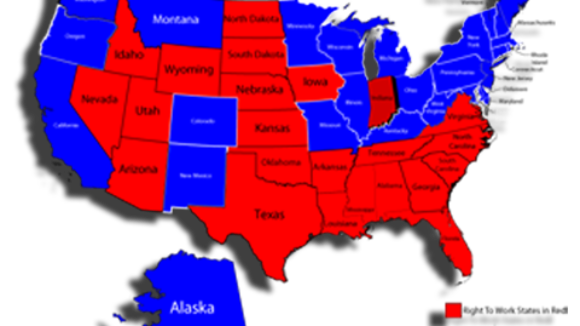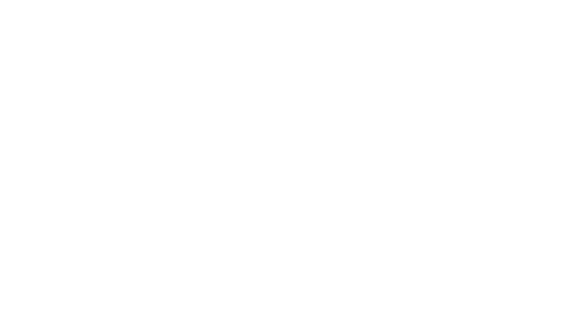What do Kroger, Align Technology, and BlueOptima Have in Common?
Kroger, Align Technology, and BlueOptima are all investing in new locations in a Right to Work state! These will create many new jobs.
Kroger, Align Technology, and BlueOptima are all investing in new locations in a Right to Work state! These will create many new jobs.

When terrorists destroyed the World Trade Center buildings on September 11, 2001, several New York-New Jersey Port Authority police officers were being paid by the Port Authority to do union business on a full-time basis. In fact, the Port…

Without Right to Work, States Did Not Make Top Ten Ranking This Year Freedom from compulsory unionism known as Right to Work is one major attribute shared by all of this year’s Chief Executive Magazine’s rankings of Top Ten Best States…
Largely because of Big Labor-backed work rules that encourage healthy employees to retire in their early 50’s and cash in unused sick leave, vacation time, and even fringe benefits to jack up their pensions, Phoenix taxpayer costs for public-safety retirements…

In Chief Executive Magazine's Best and Worst States for Business, all the top ten were from Right To Wok States. Unsurprisingly, Compulsory Unionism States took all bottom ten positions. States ranking from 1-10 are: Texas, Florida, North Carolina, Tennessee, Indiana, Virginia, South Carolina, Georgia, Utah, Arizona. States ranked from the worst, 50-41: California, New York, Illinois, Massachusetts, Michigan, New Jersey, Connecticut, Pennsylvania, Oregon, Hawaii. From the Chief Executive: 2012 Best & Worst States for business. Source: Chief Executive Magazine

Arizona Gov. Jan Brewer, who captivated the fighting to protect Arizona’s border, is taking on government labor union bosses in an effort to stabilize the state budget. Her reforms would prevent “rubber room” situations where government employees cannot be…

States Seeking a 'Brain Gain' Should Bar Compulsory Union Dues The nine states with the greatest 2000-2010 gains in their college-educated adult populations all protect the Right to Work. Of the nine states with the smallest gains, only Hurricane Katrina-devastated Louisiana does so. (Source: November-December 2011 National Right to Work Committee Newsletter) Federal data on the American workforce and employment and unemployment rates show that, even with our country struggling through the most severe recession in decades and a so-far anemic recovery, employer demand for college-educated employees has continued to rise at a surprisingly rapid clip. From 2000 to 2010, the total population of the U.S., aged 25 and over, grew by 12.1%, but the number of people in that age bracket with at least a bachelor's degree grew by 29.3%. And in October 2011, according to the U.S. Bureau of Labor Statistics, the labor force participation rate for civilians aged 25 or older with one or more higher-education degrees was 76.4% (not seasonally adjusted), barely lower than it was before the recession started. That same month, the nationwide unemployment rate for the pool of 47.3 million college-educated adults 25 or over was just 4.2%, well under half the average for the workforce as a whole. The bottom-line significance of these data is that employers across the country typically have more difficulty finding a qualified college-educated person to fill a position than a college-educated person has finding a good job. Of course, not everyone who holds a bachelor's degree and is in the work force is doing well economically. But generally speaking there is still a "seller's market" for college-educated labor in America today. Furthermore, many businesses that sustain large numbers of jobs for people with associate's degrees, high school diplomas, or less education also require a substantial number of college-educated people to operate smoothly. Therefore, the rate at which a state is gaining college-educated people, relative to the national average, is in itself a good indication of how successful the state is in creating and retaining good jobs. 'Highly Educated Employees, Like Other Employees, Benefit From Right to Work Laws'

Barack Obama is an effective president, unfortunately not of the United States but of the SEIU argues Arizona Gov. Jan Brewer: Unions — particularly public-employee unions — support illegal immigration because it serves their interests to have a permanent class of people who are financially dependent on the government. The sad secret about private-sector unions is that they are dying. All they do now is drive up the cost of doing business, thereby preventing their own members from getting hired. Arizona is what we call a “right to work” state. As mandated by the Arizona Constitution, Arizonans are free to join a union or not — it’s their choice, not some union boss’s command. And interestingly enough, when employees are given the choice of whether or not to join a union, they increasingly say no. These workers understand that the rigid workplace rules and regulations that unions promote are bad for growth, bad for competitiveness, and bad for jobs. More and more workers recognize this. That’s why in the private sector, where employees have a real stake in the success of the businesses they work for, only 7.5 percent of workers are unionized. By contrast, more than 36 percent of public-sector workers are unionized, and more than 42 percent of local-government workers. That’s because public-sector workers in the federal government don’t have to worry about unemployment. Ever. In many federal agencies, the primary threat to job security is actually death. Democratic-party bosses love government workers because each of those workers must rely upon the health and growth of government to pay his salary and guarantee his benefits. If the government contracts or shuts down for any reason, those workers are out of a job. And public-sector unions love the Democratic bosses because they keep on growing government. The more people the Democrats can put on the payroll, the more voters they can lock up for their candidates. That gives public-sector unions like the SEIU (which includes huge numbers of public employees) unbelievable leverage. Because the party bosses want to keep government workers employed and happy, they’ll give the unions just about anything they want. And the best part (for them) is that it doesn’t cost them a thing. The taxpayers pick up the tab. Liberal politicians spend taxpayer money to grow government; the unions keep voting for (and contributing to) Democrats, and the Democrats stay in office so they can spend more of the taxpayers’ money growing government. It’s a simple, corrupt, mutual back-scratching circle. How does illegal immigration play into this? Most illegal aliens work hard. That is not in dispute. But the unfortunate fact is that most illegal aliens are also unskilled and uneducated. Unskilled workers have higher unemployment rates and lower earnings. Many rely on government programs to help support them and their families. Much of this access to the welfare system by these households is gained through their American-born children, who are U.S. citizens. That means more government, which means more public-sector-union members. Even if, in the short term, more illegal immigration means fewer union jobs, the unions are okay with that. It is a strategic cost they are willing to bear. Because they know that if the Democrats keep winning, they will give the unions subsidies, grow government, and employ more union members.

South Carolina Sen. Jim DeMint takes on the NLRB again his Human Events column: Like so many federal programs, the National Labor Relations Board (NLRB) has expanded its mission far beyond its original purpose in order to wage ideological battles on the taxpayers’ dime. The NLRB was never meant to micromanage where companies can locate or how many products they can manufacture, as the NLRB under the Obama administration is currently seeking to do. To stop it, Congress should exercise its power of the purse to return the board to its original mission. The NLRB was originally established to oversee union elections and investigate violations of federal labor laws. These days it’s doing less of that than ever. In 1980, the NLRB conducted 8,531 union elections around the country, with a budget of $108 million. In 2009, it oversaw only 1,704 union elections, with a budget of $261 million. Union membership has plummeted by more than 40% since the 1980s. The rapid collapse of organized labor in America’s private sector has reduced the need for union elections—and thus, the NLRB itself—by 80% over the last three decades. Yet its budget—adjusted for inflation—remains essentially unchanged. Hence the board’s recent drift into freelance assaults on economic freedom: While 20% of its budget may be needed to perform its real job, the board seems to be misusing the other 80% for ideological mischief. The current NLRB is expanding its mission far beyond the original intent. Consider what Craig Becker, an NLRB appointee who was rejected by the Senate and then recess-appointed by President Obama, has said. “Just as U.S. citizens cannot opt against having a congressman, workers should not be able to choose against having a union as theirmonopoly-bargaining agent.” Not only has the NLRB launched an unprecedented attack on right-to-work states and job creators, it is now actively silencing nonunion workers in order to give unions a leg up in its legal case against The Boeing Company. This branch of the federal government, charged with protecting workers' rights, is suing a company on behalf of workers who are not in danger of losing their jobs, while refusing to listen to the concerns of three workers whose jobs actually are threatened by the NLRB's own actions. And the NLRB is now suing two states, Arizona and South Dakota, in an effort to overturn democratically passed laws that protect a worker's right to a secret ballot in those states. The NLRB is actually taking the stance that union bosses should be able to force workers to sign cards in public to join a union, a practice known as "card check," instead of making the decision in private without fear of intimidation. This is not enforcement—this is extremism.